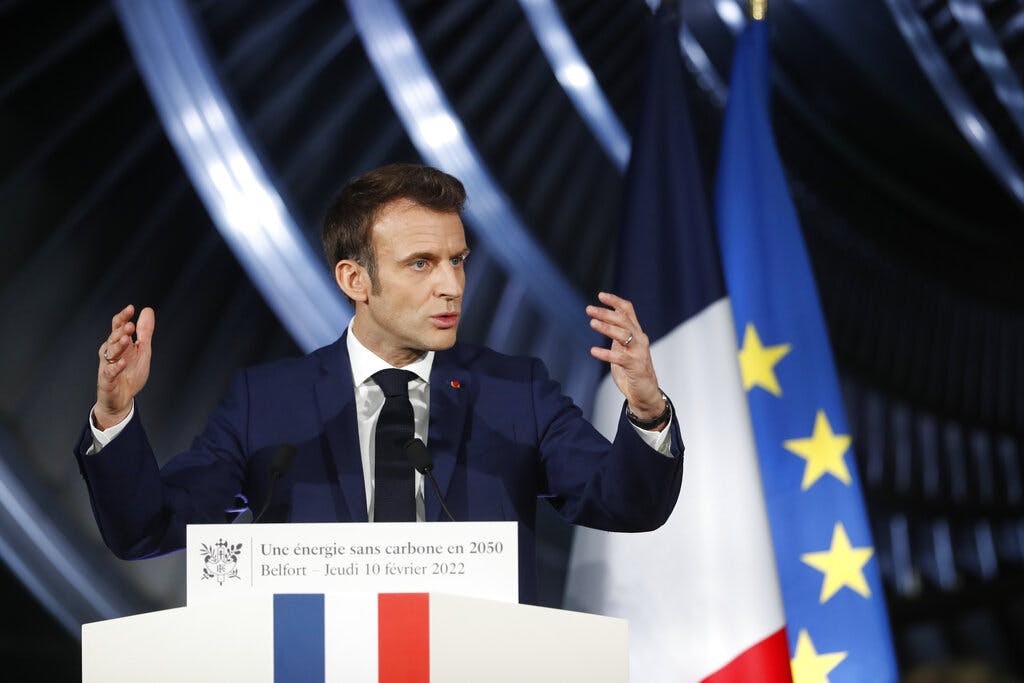‘Ukrainomania’ Scrambles the French Election
Religion was a dimension underestimated by Le Pen and even more markedly by Zemmour. They both have more traditional Catholics among their followers than other candidates.

Like most Westerners, the French grow periodically enthusiastic for foreign causes. In the 1770s — France was then still an ancien regime monarchy — the gallant new republican nation of America had to be supported against tyrannical England, which happened to be a hereditary foe since the Middle Ages.
In the 1820s, it was insurgent Greece against the Turks, and in the 1850s, Italian unity against Austria. Poland was always France’s sweetheart, from the 19th century’s uprisings to Solidarity’s civil rebellion in the 1980s, and so was Ireland, from Parnell to the IRA.
Israel was enormously popular from the late 1940s to the late 1960s, until Charles de Gaulle decided for the Arabs. And those are only cases of near unanimous support: As for the civil wars abroad — Spain, Vietnam — they would translate into fiercely fought domestic opinion wars.
Now, it is Ukraine that is all the rage. Sober observers will note that the French barely knew about this country until the Russian invasion of February 24, and that among those who knew, many would have been then more likely to side with Vladimir Putin than with Volodomyr Zelensky.
The war, however, and the extensive coverage it elicited, changed everything. The Ukrainians are now seen both as the underdog and as indomitable freedom fighters, which might be true. They are also supposed to be as European and Western as, say, Poland or the Baltic countries, which might be more questionable.
Ukrainomania is even interfering with the coming presidential election, scheduled for April 10 and 24. Emmanuel Macron, the incumbent centrist president, is the main beneficiary so far. In periods of crisis, people tend to rally around those in charge. Moreover, Mr. Macron is clearly the most pro-EU and pro-NATO candidate, at a moment when both organizations are being vindicated again as bulwarks against aggression.
A BFMTV poll released on March 8 finds that his likely share of the vote in the first round has soared 8.5 percentage points, to 33.5 percent. It reckons that Mr. Macron would be elected in a 60 percent landslide in the second round. Valérie Pécresse, the classic conservative candidate, manages to get barely 10 percent.
Too, Ukrainomania is quite a challenge for Mr. Macron’s radical foes: Marine Le Pen and Eric Zemmour on the hard right and Jean-Luc Melenchon on the hard left. All three used to be vocally anti-EU, anti-NATO, and pro-Russia. “I believe Russia is a great modern country … and a democracy,” Mme. Le Pen asserted shortly before the invasion.
“Russia is right to characterize NATO’s eastward extension as an aggression against her … I don’t believe in a Russian invasion of Ukraine,” Mr. Zemmour said.
As for Mr. Melenchon, he bluntly dismissed reports of Russia’s and China’s warmonging: “It is the Anglo-Saxons who entertain a global vision of international relations based on aggression.”
Such pronouncements may have reflected the right-wing or left-wing radicals’ infatuation with “authoritarian regimes,” as the director general of the right of center think tank Fondation for Political Innovation, Dominique Reynié, observed on February 27. They might have to do with an over-reliance on Russian-controlled media (like the Russia Today website) or Russian financial support (loans from Russian banks, as far as Mme. Le Pen is concerned).
In any event, they are not feasible — or smack of sheer incompetence — in the present context. Accordingly, Mme. Le Pen is receding by two points, to 15 percent, and Mr. Zemmour by three points, to 11 percent. Mr. Melenchon, who admitted “having being wrong,” and who dwarfs the other left-wing candidates, is however rising slightly, to 13 percent.
An additional dimension was underestimated by Mme. Le Pen and even more markedly by Mr. Zemmour — religion. They both have more traditional Catholics among their followers than other candidates. However, they failed to understand that this constituency, while otherwise not unsympathetic to Russia, would have reasons of its own to support Ukraine.
Historically a part of Eastern Orthodoxy, Ukraine switched to the Uniat compromise in the 17th century, under Polish influence: keeping Orthodox rituals and liturgy while endorsing Rome’s supremacy. Classic Orthodoxy was enforced again when Russia seized most of Ukraine in the late 18th century.
Uniatism, though, was protected by Austria in those parts of Ukraine she controlled until 1918, Galicia and Subcarpathian Ruthenia. It was among Uniats that modern Ukrainian nationalism developed in the 19th century and early 20th century.
Since then, the global Catholic Church has taken an interest in Ukrainian autonomy or independence as a tool to revive a Uniat Ukraine. After the breakup of the Soviet Union in 1991, this interest has grown considerably.
Zbigniew Brzezinski, the American academic and statesman of Polish origin, advocated some kind of a Polish-Ukrainian axis within NATO (thus exacerbating Russian paranoias). Such views are popular among the Catholic conservatives who rule Poland currently — and who entertain close ties with Catholic conservatives in America, or France.

